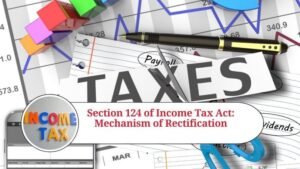The Income Tax Act of India offers various taxation schemes tailored to support businesses in specific industries, such as the tonnage tax scheme for shipping companies. Section 115VZC details conditions under which a company might be excluded from the tonnage tax scheme, typically due to involvement in non-bona fide transactions. This exclusion aims to prevent tax avoidance while ensuring that only legitimate commercial transactions benefit from the tax incentives available under this scheme.
This blog provides an in-depth understanding of Section 115VZC, its application, and the potential implications for companies in the shipping industry. Let’s explore how this section influences a company’s participation in the tonnage tax scheme, conditions for exclusion, and the remedies available.

Overview of the Tonnage Tax Scheme
The tonnage tax scheme is a concessional tax regime under Chapter XII-G of the Income Tax Act, available to eligible shipping companies. Instead of being taxed on regular business income, companies that qualify under the scheme pay tax based on the net tonnage of their fleet. This calculation offers significant tax savings, especially for large shipping enterprises, as it aligns their tax liability with their capacity to operate, rather than actual profits.
However, to prevent misuse of this scheme, the Income Tax Act outlines strict conditions, including those in Section 115VZC, which specifies circumstances leading to exclusion from the scheme.
Detailed Analysis of Section 115VZC
Section 115VZC has three subsections that define the criteria for excluding a company from the tonnage tax scheme and provide procedural safeguards. Here’s a closer look at each:
1. Exclusion from Tonnage Tax Scheme (Sub-section 1)
Under Section 115VZC(1), if a company under the tonnage tax scheme engages in specific transactions or arrangements, it risks exclusion. The transactions in question are generally those that lack genuine commercial intent or aim to exploit the tax benefits unfairly.
- Assessing Officer’s Role: The Assessing Officer (AO) is responsible for determining whether a company should be excluded based on the transaction. To proceed, the AO must issue a written order.
- Notice and Opportunity to Respond: Before finalizing the exclusion, the AO must serve a notice to the company. This notice specifies the date and time for the company to explain why it should not be excluded. The inclusion of a response period provides the company with a fair opportunity to demonstrate compliance.
- Approval Requirement: Before the Assessing Officer can pass an exclusion order, prior approval must be obtained from a higher authority, specifically the Principal Chief Commissioner or Chief Commissioner. This requirement ensures an additional layer of oversight, preventing arbitrary or erroneous exclusions.
2. Exceptions to Exclusion (Sub-section 2)
Section 115VZC(2) offers a crucial safeguard for companies that genuinely comply with the spirit of the law.
- Proof of Bona Fide Intent: If a company can prove to the Assessing Officer’s satisfaction that the transaction or arrangement was a genuine commercial activity without tax-avoidance motives, it can avoid exclusion. This provision protects companies that might have inadvertently engaged in certain transactions but had no intent to misuse the tax scheme.
- Burden of Proof: The onus lies on the company to establish that the transaction was bona fide. Thus, maintaining adequate documentation and justification for each commercial transaction is essential to demonstrate compliance with the tax scheme.
3. Effective Date of Exclusion (Sub-section 3)
Once excluded from the scheme, Section 115VZC(3) stipulates when the exclusion takes effect.
- Effective from the Previous Year: If the Assessing Officer orders exclusion under Section 115VZC, it applies retroactively from the start of the previous year in which the questionable transaction or arrangement took place.
- Impact on Tax Liabilities: With retroactive exclusion, a company may face recalculated tax liabilities under regular tax provisions for the year in question, potentially leading to higher tax dues.
Practical Implications of Section 115VZC
For shipping companies in India, understanding Section 115VZC is crucial for compliance and financial planning. The section underscores the importance of transparency and bona fide commercial activity, as companies attempting to exploit the scheme risk exclusion and retroactive taxation.
To avoid complications, tonnage tax companies should:
- Ensure Transparent Transactions: Engaging in bona fide transactions with thorough documentation minimizes the risk of scrutiny.
- Prepare for Compliance Checks: Regular audits and assessments of transactions can help in aligning with Section 115VZC provisions, especially regarding documentation to establish genuine intent.
- Consult Legal and Tax Experts: Professional guidance can assist companies in interpreting and complying with tax provisions, ensuring adherence to the tonnage tax scheme without risking exclusion.
Frequently Asked Questions (FAQs)
Q1: What is the tonnage tax scheme under the Income Tax Act?
A: The tonnage tax scheme provides a concessional tax regime for shipping companies, where tax is calculated based on the tonnage capacity of the fleet rather than traditional profit-based taxation.
Q2: Under what conditions can a company be excluded from the tonnage tax scheme?
A: A company may be excluded if it is involved in transactions or arrangements lacking genuine commercial intent or aiming for tax benefits contrary to Section 115VZB(1).
Q3: Can a company appeal if excluded from the tonnage tax scheme?
A: Yes, before the exclusion order, the company receives a notice to present its case. If the company demonstrates that the transaction was bona fide, it may avoid exclusion.
Q4: What happens if a company is excluded from the tonnage tax scheme?
A: Exclusion is effective from the beginning of the previous year in which the transaction occurred, and the company’s tax liabilities will revert to the standard tax calculation method.
Conclusion
Section 115VZC is a critical part of the regulatory framework around the tonnage tax scheme, helping prevent tax evasion while maintaining fairness. Companies under this scheme must adhere strictly to the guidelines to avoid exclusion. By ensuring bona fide commercial practices, shipping companies can continue to benefit from the scheme without risking penalties. As always, consulting tax professionals for clarity on complex transactions remains beneficial in navigating the requirements of Section 115VZC.
For more insights into tax provisions and compliance, visit our blog at www.smarttaxsaver.com, where we cover a range of topics to help businesses stay informed and compliant with the latest tax regulations.




